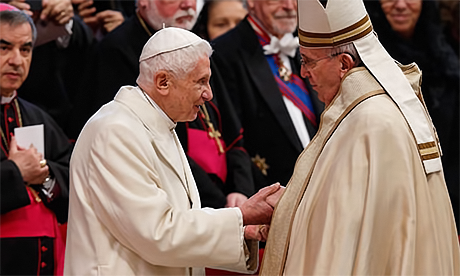“We are all responsible for the protection and care of the environment. This responsibility knows no boundaries.”
“Preservation of the environment, promotion of sustainable development and particular attention to climate change are matters of grave concern for the entire human family.”
“Too often, attention is diverted from the needs of populations, insufficient emphasis is placed on work in the fields, and the goods of the earth are not given adequate protection. As a result, economic imbalance is produced, and the inalienable rights and dignity of every human person are ignored.”
After reading those statements, you might be thinking that Pope Francis has released his highly anticipated encyclical on the environment ahead of its projected June publication date, but that is not the case.
Nor do we have an advance copy.
These statements — each making a strong case for responsibly caring for God’s creation — all were given by Pope Benedict XVI at various times during his pontificate. There is a reason our former pontiff earned the nickname “the green pope.”
Yet despite his consistent voice on the issue, the environment remains one of the most politically charged and divisive issues facing the modern Church, particularly in the West.
This especially has been the case in recent weeks as the world awaits the release of Francis’ encyclical.
The main bone of contention in this debate is climate change.
While we do believe that this is an issue that has serious implications on human welfare, we are not choosing to argue its merits today.
On the contrary, we acknowledge the right of all parties engaged in the debate to participate in a rational and responsible exchange of thoughts, ideas and information.
A line is crossed, however, when such rational exchange turns into venom-spewing, ideologically based commentary.
And this is what has taken place.
Well before the encyclical’s release, a veritable campaign against its content has not only been initiated, but has been growing in intensity.
That these efforts presuppose the document’s content is bad enough, but they have gone much further.
Some Catholic observers and commentators have recommended that their fellow members in faith completely ignore the work, calling it baseless and not a priority.
Others have even mocked the Holy Father and questioned his mental state.
It’s shameful behavior, and hardly befitting a Church that calls itself “one, holy and apostolic.”
That the majority of this vitriol should come at the hands of self-styled conservatives is as disappointing as it is ironic.
Just a few short years ago, with Pope Benedict at the helm of the Church, it was these same Catholics calling on their self-styled liberal counterparts to not ignore or berate the teachings or the office of the Holy Father — in short to not be “cafeteria Catholics” when they disagreed with Benedict.
Now the situation is reversed, and these offended Catholics are becoming the perpetrators of the same offensive abuse. Continue reading
Additional readingNews category: Analysis and Comment.




